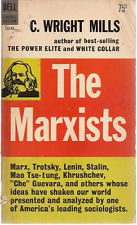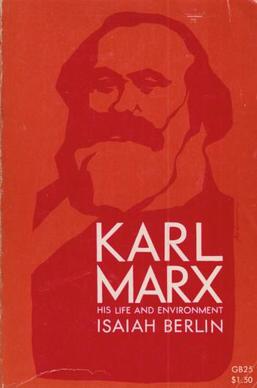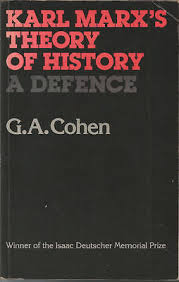
Karl Marx was a German-born philosopher, political theorist, economist, historian, sociologist, journalist, and revolutionary socialist. His best-known works are the 1848 pamphlet The Communist Manifesto and his three-volume Das Kapital (1867–1894); the latter employs his critical approach of historical materialism in an analysis of capitalism, in the culmination of his intellectual endeavours. Marx's ideas and their subsequent development, collectively known as Marxism, have had enormous influence on modern intellectual, economic and political history.

Franz Erdmann Mehring was a German communist historian, literary and art critic, philosopher, and revolutionary socialist politician who was a senior member of the Spartacus League during the German Revolution of 1918–1919.

David McLellan is an English scholar of Marxism. He has written extensively on the thought of Karl Marx, Friedrich Engels and Simone Weil.

The Marxists is a 1962 book about Marxism by the sociologist C. Wright Mills.

Marx and Human Nature: Refutation of a Legend is a 1983 book by the political theorist Norman Geras, in which the author discusses the philosopher Karl Marx's theory of human nature with reference to Marx's Sixth Thesis on Feuerbach. Geras argues that Marx did not deny the existence of a universal human nature, and maintains that the concept of human nature is compatible with historical materialism.

Marx after Sraffa is a 1977 book about Marxist economics by the economist Ian Steedman, in which the author argues against the labor theory of value.

The Concept of Nature in Marx is a 1962 book by the philosopher Alfred Schmidt. First published in English in 1971, it is a classic account of Karl Marx's ideas about nature.

Marx's Concept of Man is a 1961 book about Karl Marx's theory of human nature by the psychoanalyst Erich Fromm. The work sold widely thanks to the popularity of Marx's early writings, which was a product of the existentialism of the 1940s.

The Young Hegelians and Karl Marx is a 1969 book by the political scientist David McLellan.

Karl Marx: His Life and Environment is a 1939 intellectual biography of the philosopher, social scientist, economist and revolutionary Karl Marx by the historian of ideas Isaiah Berlin.

Studies in the Labour Theory of Value is a book about the labor theory of value by the economist Ronald L. Meek. The book has been praised by commentators.

Making Sense of Marx is a 1985 book about Karl Marx by the social and political theorist Jon Elster, in which the author reevaluates Marx's ideas. The book has received a mixture of praise and criticism from commentators.

The Formation of the Economic Thought of Karl Marx: 1843 to Capital is a 1967 book by the Marxist theorist Ernest Mandel, in which the author discusses the economic theories of Karl Marx. It appeared in English translation in 1971.

An Introduction to Karl Marx is a 1986 book about the philosopher Karl Marx by the social and political theorist Jon Elster. It is a much shorter version of Elster's Making Sense of Marx, published a year earlier.

Karl Marx: The Story of His Life is a 1918 book about the philosopher, economist and revolutionary Karl Marx by the German historian Franz Mehring. Considered the classical biography of Marx for a long time, the work has been translated into many languages, including Russian (1920), Dutch (1921), Swedish (1921–1922), Danish (1922), Hungarian (1925), Japanese (1930), Spanish (1932), English (1935), Hebrew (1940–1941), Slovenian (1974), Turkish (2012).

Marxism: An Historical and Critical Study is a book by the socialist intellectual George Lichtheim, in which the author provides a study of the development of Marxism from its origins to 1917. It has been seen as a classic work.

Karl Marx's Theory of History: A Defence is a 1978 book by the philosopher G. A. Cohen, the culmination of his attempts to reformulate Karl Marx's doctrines of alienation, exploitation, and historical materialism. Cohen, who interprets Marxism as a scientific theory of history, applies the techniques of analytic philosophy to the elucidation and defence of Marx's materialist conception of history.

History and Class Consciousness: Studies in Marxist Dialectics is a 1923 book by the Hungarian philosopher György Lukács, in which the author re-emphasizes the philosopher Georg Wilhelm Friedrich Hegel's influence on the philosopher Karl Marx, analyzes the concept of "class consciousness," and attempts a philosophical justification of Bolshevism.

Karl Marx was a German philosopher, economist, sociologist, historian, journalist, and revolutionary socialist. Marx's work in economics laid the basis for the current understanding of labour and its relation to capital, and has influenced much of subsequent economic thought. He published numerous books during his lifetime, the most notable being The Communist Manifesto. Marx studied at the University of Bonn and the University of Berlin, where he became interested in the philosophical ideas of the Young Hegelians. After his studies, he wrote for a radical newspaper in Cologne, and began to work out his theory of dialectical materialism. He moved to Paris in 1843, where he began writing for other radical newspapers and met Fredrick Engels, who would become his lifelong friend and collaborator. In 1845 he was exiled and moved to London together with his wife and children where he continued writing and formulating his theories about social and economic activity. He also campaigned for socialism and became a significant figure in the International Workingmen's Association.

This page gives an overview of biographies of Karl Marx, the German born philosopher, economist, sociologist, journalist, and revolutionary socialist. Born in Trier to a middle-class family, he studied Hegelian philosophy, and political economy, lived in many places, like Berlin, Paris, Brussels and London, and developed a fundamental, theoretical and practical critique on industrial capitalism.




















